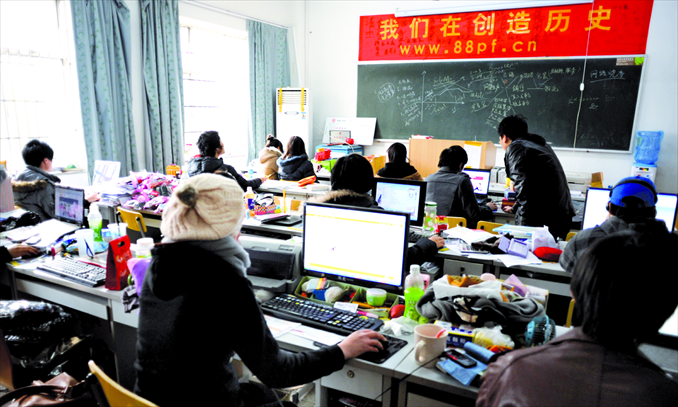
Students run their online businesses from a classroom at Yiwu Industrial & Commercial College. Photo: CFP
People in Yiwu pride themselves on being born traders. To tap into this idea, a local college in this city of Zhejiang Province launched a business starting school aimed at training students as entrepreneurs and demanding them to make ambitious business plans during their three-year education.
Unlike other universities and colleges, students at the business starting school, under the Yiwu Industrial & Commercial College, are not strictly required to attend classes, achieve high scores in exams or publish a thesis to earn credits. Instead, they are measured by how much money they make through running online businesses on Taobao, China’s largest online auction and shopping site.
Reportedly, more than 1,800 out of 8,800 students at the college had become fledgling entrepreneurs, mostly on Taobao. This nets them an average of 1,500 yuan ($235) a month, which can at least cover their personal living expenses. They get their diplomas once their shops earn 10,000 yuan a month on average.
“College entrepreneurship is the most efficient way to educate them in this case,” Jia Shaohua, vice president of the Yiwu Industrial & Commercial College commented.
“It can increase their motivation and help them find jobs after graduation.”
Business top priority
With the booming of online trade in China in recent years, Jia saw an opportunity and launched the business starting school in 2008.
“Since higher education became broadly accessible, many college students have started their own businesses,” Jia said.
Three hundred students are enrolled in the business starting school at the moment and they are able to ask for leave should business problems occur.
To help students even further, the school has allocated a building to the budding businessmen where classrooms with 24-hour Internet are turned into offices and warehouses.
A special curriculum is in place. They take lessons relevant to e-commerce, such as design, photography and management.
“As long as you show your passion and devote yourself to your business, the college will back you,” Zhu Huabing, head of the business starting school, told the Global Times.
These methods also sparked great controversy when a graduate who had failed six subjects was unexpectedly granted a diploma and hailed as an “outstanding graduate.”
Shi Haojie had hit a business volume of more than 10 million yuan a year and had become a legend at the college. He now owns two companies and one factory and employs 300 people in Wenzhou, Shenzhen and Yiwu.
However, according to the school regulation, this commercial genius faced being kicked out of school for failing so many classes.
Jia, the vice president of the college, gave him a chance. “If such an excellent student as Shi was not granted a diploma, it would shame him, the school and the whole education system in China,” Jia told Dragon TV.
Money first and foremost
In a classroom, a dozen students are writing to clients, talking to them on the phone or updating their websites. Piles of small commodities, such as socks, silk stockings, hats and household items are piled up.
In the corridor, portraits and inspirational quotes from famous entrepreneurs such as Apple CEO Steve Jobs, CEO of Alibaba Jack Ma and school celebrities suchShi Haojie hang on the wall.
Ma Junli, a freshman who runs a shop selling creative household items, is busy packaging the goods to send out a dozen of parcels that day.
“I got a low grade in the college entrance examination, so I had to do something to prove myself in some other way,” Ma said frankly.
As a junior college, it is easily accessible for high school graduates.
“We’re not very familiar with the regulations and rules of Taobao, but we hope we can catch up with the field in the next few years,” classmate Cheng Chao said confidently.
Cheng, 19, was rebellious in middle school and skipped almost every class to play video games.
Entrepreneurship changed him. He now owns a shop selling knitting wear and he says, “I have no degree from famous universities, and I might not be able to find a good job in a society that attaches great importance to your education background, but I can at least be self-employed.”
To better take care of the business, Ma, along with seven other students, applied to stay at school for their coming summer vacation.
“I am always the first to get a tan in summer and the first to put on winter clothes as I have to ride my motorcycle to fetch the goods in the wholesale market,” Wu Yunfei, a 22-year-old sophomore from architecture school explained.
Wu has not attended any class since last month as his online shop reached a monthly revenue of 5,000 yuan. Although he is not enrolled at the business starting school, the college extends its preferential policies to students in other departments.
“You don’t have to be a student at the business starting school to be a good businessman,” Wu said. “Instead, we can do better than them if we are diligent and realize the business opportunities.”

“Universities and colleges are for students to acquire knowledge and establish a correct outlook on life, rather than solely be encouraged to pursue money and fortune,” Professor Zhang Yiwu from Peking University told the Global Times.
The general education on the college students should not be abandoned when colleges are exploring creative curriculums, Zhang said.
Teachers have complained that the privileges enjoyed by the students have disturbed the normal order of school.
“When take attendance, students tell me some of them are off taking care of their online shops, while teachers know some only use this excuse to skip class,” one teacher told the Global Times.
Two students were kicked out for abusing their Internet privileges to play online games.
The current exit strategy was established to give willing students a second choice. Any student finding themselves struggling as entrepreneurs can apply for a chance to switch schools at the end of the first semester. In the meantime, students who lack the passion and capability to start a business will be transferred to other schools after careful observation and evaluation.
Overall, it seems the commercial atmosphere has been beneficial. Students are able to share practical knowledge and advice with each other under professional campus guidance. They also learned skills that pure academic paths would not allow them to: how to set fair prices, bargaining with suppliers and learning to withstand difficulties before breaking even.
Employment and creativity
Graduates have faced a severe employment situation after graduation in a crowded job market. There are cases where families who spent a life-time saving tosend a child to school became impoverished after the student graduated and stayed unemployed.
The rewards for university students are not optimistic. Statistics showed that the average starting salary for university graduates is a paltry 2,300 yuan per month.
Media remarked the college has overthrown the current education system that highly valued academic achievements and led to the current scenario.
It is worth trying, Yang Dongping, an education expert from Beijing Institute of Technology, agreed.
“Of course students are expected to acquire knowledge at a college. But the key question is what, when and how to learn,” Yang said.
“For those who are unwilling to learn in class, it is our duty to teach them
Some students like Yang Fugang have realized this necessity and undergone several rounds of innovation and reform concerning its business model and core products.
Instead of selling products from other suppliers, Yang has established his own brand and cooperated with factories to create the new products since last year.
Shi Haojie has also employed a professional development team to create new products on 3D glasses.
“I suggest the students learn in class while pursuing their business dreams,” Shi said, adding that he felt lucky that he didn’t have to stick to classes in college.
“I don’t expect them to become millionaires while still in school,” said Zhu the head of the business starting school, “I hope this three-year education can sow the seed of enterprise in the students and when the time is ripe, the seed can take root, bloom and fructify.”
